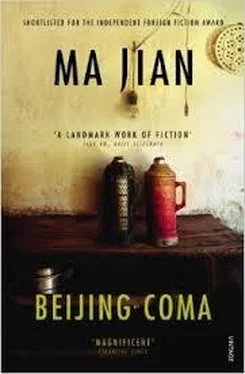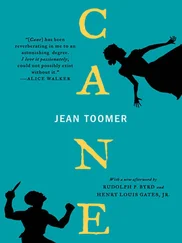‘I’ve heard that, after just one week of this treatment, paraplegics have been able to walk again,’ Mao Da says. He still speaks in the wooden tones of a government cadre.
My mother’s voice sounds full of gratitude. ‘Here, have a cigarette, you two. Go on! I really can’t thank you both enough!’ She always keeps cigarettes in her pocket now, to hand out to anyone who offers help.
‘We rented this shack for you from a peasant,’ Zhang Jie says. ‘If someone comes and asks questions, tell them you’re from Fangshan County. Here’s the document stating that you supported the government crackdown. No hospital will treat you without it.’
‘We left some lights on in your flat when we locked up for you last night, so that your neighbours won’t get suspicious,’ Mao Da says, then takes a puff of his cigarette.
‘The police haven’t visited us for almost a month,’ my mother says. ‘It’s probably the winter weather that’s kept them away.’
‘You’re only a kilometre from the hospital’s north entrance here,’ Mao Da says. ‘We paid the peasant who owns this shack an extra three yuan so that you can use his handcart. You should be able to wheel Dai Wei to the hospital without being seen by too many people.’
‘Have you got enough money and grain coupons, Auntie?’ Zhang Jie asks.
‘Last month, the wholesale markets were selling grain at knockdown prices,’ Mao Da says. ‘We probably won’t be using grain coupons much longer.’
‘The last bus back to Beijing will be leaving soon,’ my mother says. ‘You’d better hurry. I wouldn’t want you to miss your classes tomorrow.’
‘Our grades don’t matter any more,’ Mao Da says. ‘We’ll be given jobs out in the sticks whatever marks we get. I don’t care. I’ve decided to go to Shenzhen next year, and look for a job in a private company. Here’s Dai Wei’s hospital card. Go to the brick building we took you to this morning and ask for the neurosurgery department. Your appointments are at five o’clock every afternoon. I registered him under my surname, so he’ll be known as Mao Daiwei. Right, we’d better get going. I’ll visit you again in a couple of days. Dai Wei, hurry up and wake up, will you? Show those bastards that we won’t be defeated!’ He pats the blanket draped over my stomach. I’m freezing. All I’m wearing is a vest and thin cotton trousers.
Only when I’m wheeled inside the hospital’s high-pressure oxygen room a few hours later do my limbs begin to thaw out. A male voice says, ‘First we must check whether he has any metal objects on him.’
‘I’ve removed them all,’ my mother says. ‘It’s very hot in here! Please, have a cigarette.’
‘No thanks, I don’t smoke.’ The man turns on some switches, taps the metal oxygen canisters, shuffles around the room for a moment, then pushes me into the chamber. ‘As the pressure starts to increase, his ears might hurt and he’ll feel a rise in temperature.’
‘I’ve been told that already. Don’t worry about the pain. He’s a vegetable, after all.’
I know about these chambers. They help boost oxygen levels in the brain and control the spread of bacteria. When I read about them in the papers, I had no idea that one day I’d be pushed into one. If the pressure or heat become unbearable, I have no means of letting anyone know. What if my eardrums burst?
The door to the chamber is sealed shut. A pain develops in my ears that soon becomes excruciating. The wound in my head seems to catch fire. As the temperature shoots up, I feel myself lapsing into unconsciousness.
From the wound in your frontal lobe, you slip into the brain’s central fissure, then travel down the vagus nerve to the noisy thoracic cavity.
It was Mao Da who woke me up the morning after the aborted march. His face was drawn and pale.
‘That meeting you held last night — was it in this dorm?’ he asked.
‘No, Shu Tong’s.’
‘You reshuffled the Organising Committee, didn’t you? Shu Tong resigned, Old Fu was sacked and Ke Xi was promoted.’
‘Yes. Who told you?’ I sat up and pulled on a T-shirt. I could smell Dong Rong’s smelly trainers. His socks stank as well. Tian Yi always complained about the stench when she visited our dorm. Qiu Fa walked off to the washroom carrying his enamel basin. Xiao Li was still asleep.
Mao Da glanced around the dorm to check no one else was listening, then whispered, ‘You are the only person I will tell this to. Listen, because I’m only going to say it once: the university’s Party branch filmed your meeting last night with an infrared camera. I’m a Party member. They called me over and asked me to identify who you were. Your friend Mou Sen is in deep trouble. They’ve had people following him for days. They suspect him of being a Black Hand — an undercover conspirator working for a secret organisation. They’ve sent the tape to the Ministry of State Security. Let me remind you that the Party considers student demonstrations to be a form of “contradiction among the people”, but views the establishment of independent organisations as a “contradiction between the people and the enemy”, which is a much more serious affair. I strongly advise you to dissolve your committee immediately.’
‘I would never have guessed that you were a spy, Mao Da,’ I said, astounded by this revelation.
‘I’ve chosen to tell you because I know you won’t blow my cover. I don’t want any of you to get into trouble. I didn’t sleep all night. If you dissolve the committee at once, you’ll be fine.’ He folded his quilt, placed it neatly on the end of his bed, picked up his bag and left the room.
I was dumbstruck. My legs were shaking. The face of the executed convict we’d dissected at Southern University flashed through my mind. I remembered the dirty graze above his one remaining eye. He’d been condemned to death for setting up a group called The Young Marxists. In the past, we hadn’t dared form an organisation. This time, we had gone too far.
I lit a cigarette. My throat felt tight. The bicycle that Dong Rong had bought two months before lay propped against the wall. He couldn’t sleep at night unless he brought it into the room. He was worried that if he locked it up outside someone might steal it.
I stuck my head out of the window and looked down. I could smell the mud on the trucks driving into town from the countryside, and the sour scent of the discarded eggshells behind the street stall. Everything looked the same as it had the previous day. The only difference was that there were now two vans I’d never seen before parked outside our block.
Xiao Li woke up. I told him that the police were going to arrest us. He said, ‘They won’t do that. The most they’ll do is monitor us to make sure we’re not meeting with foreign journalists or dissidents.’
I passed him a cigarette.
After a couple of drags I felt a little calmer. I reminded myself that the authorities had reacted leniently to our New Year’s Day demonstration in 1987 and the 1988 protests that followed the murder of the graduate student. And we were less vulnerable this time, because so many more students had got involved.
‘Just make sure you don’t go anywhere alone,’ Xiao Li said, glancing out of the window. ‘They can’t arrest you if you’re in a group.’ I worried for him. His peasant background hadn’t equipped him for a situation like this.
I wanted to warn Mou Sen at once that he was being followed, so I went down to the ground floor and gave him a call.
Fortunately, he was in his dorm. I told him go and stay at his girlfriend Yanyan’s flat and lie low for a few days.
I could tell from his voice that he was scared.
‘Yanyan’s away at a conference. Where else can I go?’ Although Yanyan was fond of Mou Sen, she was very ambitious and her job always came first. She was now an assistant social affairs reporter at the Workers’ Daily .
Читать дальше












